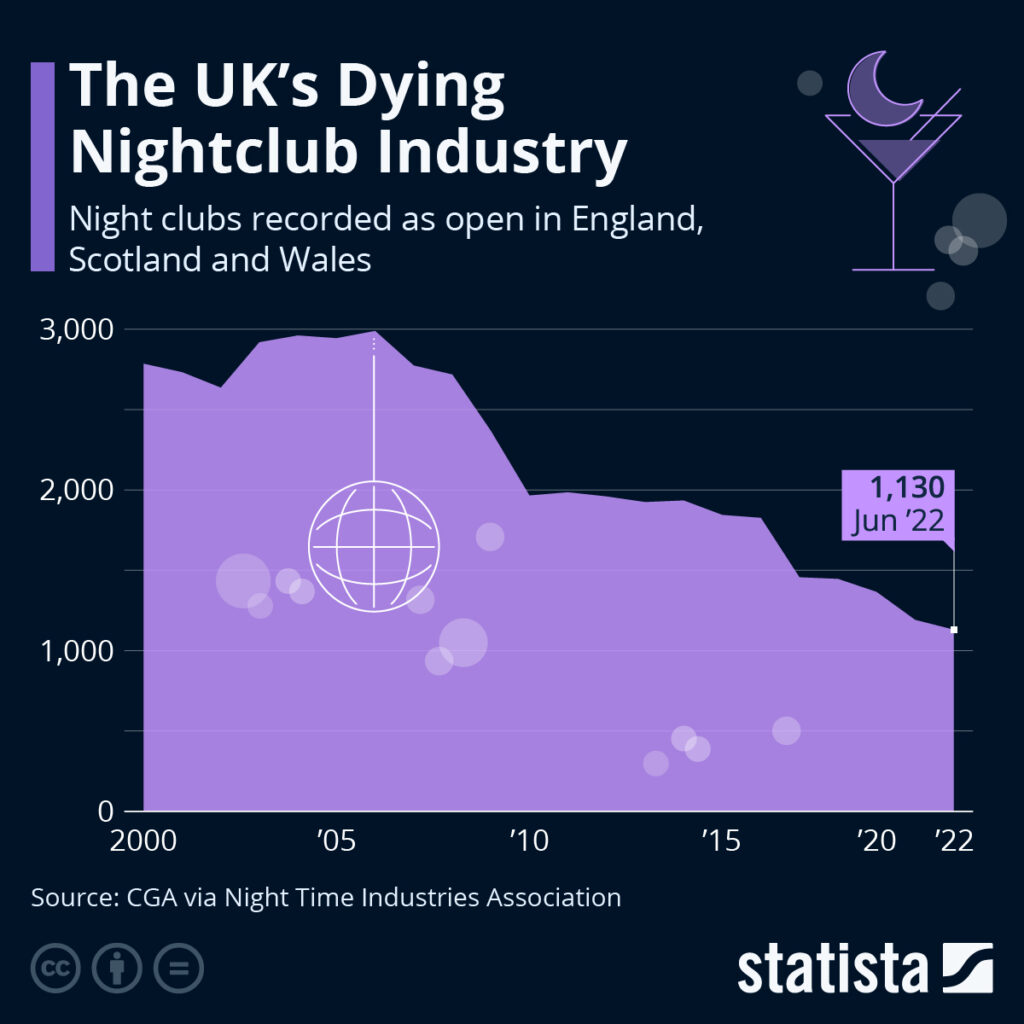The results are in and it’s a landslide victory for Labour.
In the past 14 years, the country has changed dramatically during the Conservative Leadership, as has the nightlife sector. We’ve seen Brexit, a cost of living crisis, and a worldwide pandemic. The very face of our highstreets has changed, with a swathe of closures and new business trends. One of the most severely affected industries is the hospitality industry.
(See a recap of the last 14 years of Conservatives in power here)
The number of nightclubs in England, Scotland and Wales is now at its lowest in more than two decades. Early 2024, Rekom, owner of Pryzm and Atik nightclubs, was the latest superclub owners to announce closures, with 17 venues closing and a loss of 500 jobs. Bosses said they’d been hit by students cutting back on midweek nights out because of cost-of-living pressures. A spokesperson for the Liberal Democrats said to the BBC; “The sheer number of closed shops, pubs and restaurants in high streets across the UK is a testament to the Conservatives’ utter failure to support Britain’s local economies.”
The statistics make for a shocking read:
- In 2023, 30% of UK nightclubs closed.
- Between March 2020 and December 2023, 396 nightclubs closed, accounting for 31% of the total industry.
- In just 2024, newly-released figures by CGA Neilson, suggest there have been 5 nightclub closures every week. 80% of these closures were independent businesses.

The conservatives were praised for the wider reaching financial support offered during the lockdowns. It’s predicted many more hospitality businesses would have closed if not for the support. Nevertheless, that support was quickly with drawn post-pandemic, and calls for the VAT reduction were not heard.
Will Labour be any more receptive?…
What to expect for nightclubs post-election?
The NTIA’s Michael Kill said to the BBC that we’ve seen a “considerable amount of broad brush commitments” in manifestos from all political parties, and was “frustrated by the lack of detail and substance”.
After reviewing the Labour manifesto, there is little to no reference to the hospitality sector. A shame considering the hospitality sector is the fifth largest contributor to the overall UK economy – and has been bleeding for sometime.
There is no guarantee that government department will stay the same. In fact, it’s highly likely that we will see changes across Whitehall. Mike Kill, as well as many in the industry such as Sacha Lord and Kate Nicholls, have pushed for the appointment of a Nightlife Secretary – leading a government office alongside health, education, transport.
This would ensure that nightlife priorities are being heard, working closely with the Nightlife Tsars of major cities Bristol, London and Manchester.
When will the new Prime Minister and Sectaries be sworn into office?
The new Parliament will first meet on Tuesday 9th July 2024. Here the new Prime Minister with take an oath of allegiance to the Crown, members can either swear in using a religious text or take a non-religious, solemn affirmation. This swearing-in process continues for a week.
The first business questions of the new Parliament is expected to take place on Thursday 18th July. Here we will learn more about the first actions the new government wish to take in Parliament.
Rachel Reeves has ruled out a Summer Budget, stating that “The OBR requires 10 weeks’ notice to provide an independent forecast ahead of a Budget.” The Sunday Times reported that Reeves will prepare for a budget to take place in either September or October.
An October budget should be expected by nightlife businesses, and is the most likely time when financial support or increased sector spending will be realised.
Indeed, it could be a long nervous wait for nightlife operators.
Will there be changes to work processes post-election?
The Labour Party in their New Deal document published in May made us aware of a number of changes they would wish to introduce, which would have a major impact on businesses going forward. These included:
- A host of changes to the law in the area of trade union rights and access to the workplace.
- Reversing a number of pieces of Conservative legislation aimed at restricting unions. Improving the ability of unions to become recognised.
- Changes to individual employment rights including revising the law around zero hours contracts; ending the ‘fire and rehire’ culture; day one rights for employees; payment of SSP from the first day of employment; a review of people’s employment status.
- Changes to equality legislation (flexible working; menopause; maternity discrimination, Equal Pay, bereavement, time limits for making claims of unfair dismissal).
The Labour Party Manifesto also mentions:
- The setting up of a ‘Single Enforcement Body’ to enforce workers’ rights.
- Amending the minimum wage criteria.
- Increasing the scope of collective bargaining within the adult social care sector a new Race Equality Act.
The Manifesto sets out what the new Government would like to do, but we will have to wait and see what they actually make law…

Carla Denyer, Nightlife Unscripted
As part of our NIGHTLIFE UNSCRIPTED campaign, we interviewed industry leaders and key figures. One of which was Carla Denyer, Green Party co-leader, who just secured a successful seat win in Bristol Central.
See here what Carla has to say about sustainability in the nightlife economy.
